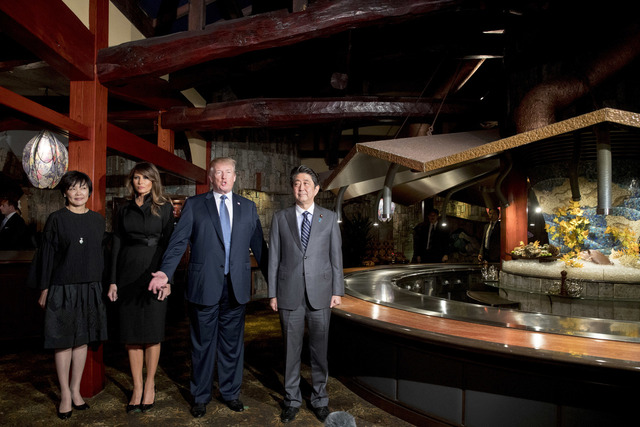 |
|
US President Donald Trump and Japanese Prime Minister Shinzo Abe are photographed with their wives prior to dining at a famous hot plate restaurant in Tokyo on Nov. 5. (AP/Yonhap News)
|
Costly defense purchases are the price of alliance with the United States
“[Japanese Prime Minister Shinzo Abe] will shoot [North Korean] missiles out of the sky when he completes the purchase of lots of additional military equipment from the United States…and we make the best military equipment, by far…the F-35 fighter…is the greatest in the world.” The most striking thing US President Donald Trump said during his three-day visit to Japan was his boasting about US weaponry. He made the above remarks at a Nov. 6 press conference in Tokyo, responding as if on cue to a question about Japan’s decision not to shoot down North Korean missiles passing through their skies in August and September. He blithely and simplistically suggested that the solution lay not in comprehensive security policies for the sake of allies South Korea and Japan, but purely in buying more US weapons. Through his Asia trip, Trump’s focus was entirely on how many more US-made items – including weapons – he could sell to northeast Asian states. Abe rolled out the red carpet for Trump, serving him a wagyu steak dinner at a hot plate restaurant and arranging to play golf together with world’s fourth-ranked player. As much as he may have enjoyed it, Trump’s seemed to be channeling all his energies into making deals to benefit the US. Abe, for his past, appeared somewhat resigned to it. When Trump began extolling US weapons, he responded by saying that Japan purchases “a lot of” its defense equipment from the US and that “qualitatively and quantitatively, we have to enhance our defense capability.” There had been some concerns voiced in Japan about increased US weapon purchases before Trump arrived. In its recent sales of the F-35 and other state-of-the-art weaponry, the US government has adopted a foreign military sales (FMS) format. It’s a system where Washington conducts weapon transactions directly with other governments instead of defense companies, with a structure that fully benefits its own side. Weapon prices are set by the US government, and while payment may be deferred, it must be made beforehand. Japan has introduced 58.9 billion yen (US$522.3 million) worth of US weapons this way since 2011, but its Defense Ministry’s demands for next year are eight times higher at 480.4 billion yen (US$4.3 billion). Some have fretted that the Japanese defense industry may suffer a decline as more and more weapons are procured through FMS. The reason Tokyo has so meekly submitted to meeting the US’s demands is because of the strategic calculation that its alliance with the US is essential to check China’s rising power. Strengthening the US-Japan alliance is all the more important because Japan cannot independently re-arm, nor can it realistically adopt a neutral nation system like Switzerland’s. Some have voiced the opinion that it needs to strengthen its bonds with fellow Asian countries, including China, but the alliance with the US remains its fundamental priority. In other words, Abe’s behavior with Trump – the closeness bordering on excess – is all thoroughly based on Japan’s calculations. Ahead of Trump’s visit, many people worried about whether his scheduling of three days in Japan and just two days in South Korea meant the South Korea-US alliance was in danger or Seoul was being “bypassed” on important security issues affecting the peninsula. The Japanese media were all abuzz with talk of Seoul being shut out of the loop, citing South Korean press reports as the visit drew closer. In light of the South Korean security environment, the alliance with the US is of course necessary and important. But the US’s alliances, whether with South Korea or Japan, are a means, rather than ends in themselves. As a superpower, the US is well aware of this – and will continue demanding a price. If we continue to regard the South Korea-US alliance as sacred and an end in itself, the US will start asking for even more than it’s doing now. By Cho Ki-weon, Tokyo correspondent Please direct questions or comments to [english@hani.co.kr]






